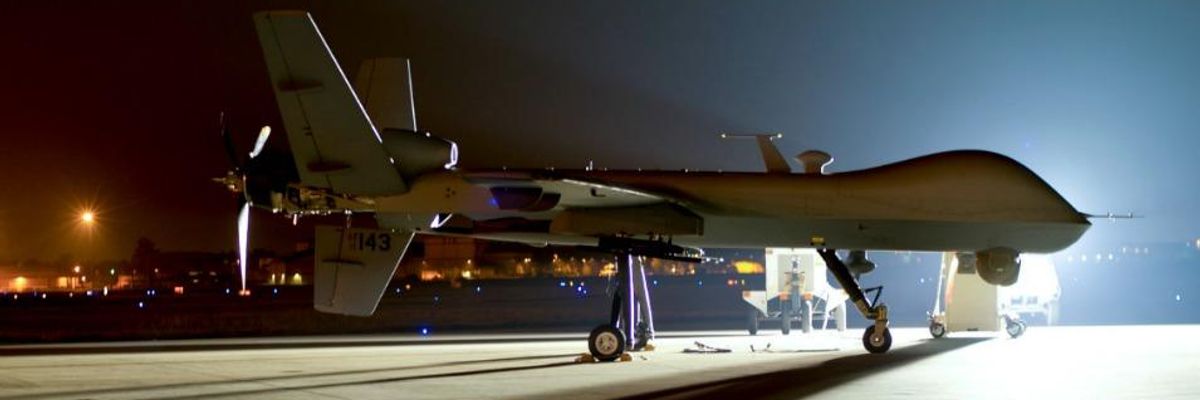The embrace of killer drones by the United States government is likely to increase anti-U.S. sentiment, erode national sovereignty and trigger a "slippery slope" into endless war, a prominent military and intelligence panel warned in a new report published Thursday.
Recommendations and Report of the Task Force on United States Drone Policy (pdf) is the result of a year-long study by a high-level task force of military, intelligence and foreign policy experts assembled by the nonpartisan Stimson Center.
In the report, the panel warns that the proliferation of killer drones as a "pillar of U.S. counterterrorism strategy" has enabled policies that "likely would not have been adopted in the absence of UAVs [Unmanned Aerial Vehicles]," particularly the "extraordinarily broad" interpretation of the Authorization for Use of Military Force, or AUMF.
Echoing the concerns of many anti-war groups, the panel notes that the increasing use of lethal drones "may create a slippery slope leading to continual or wider wars."
The report continues:
The seemingly low-risk and low-cost missions enabled by UAV technologies may encourage the United States to fly such missions more often, pursuing targets with UAVs that would be deemed not worth pursuing if manned aircraft or special operation forces had to be put at risk.
UAVs also create an escalation risk insofar as they may lower the bar to enter a conflict, without increasing the likelihood of a satisfactory outcome.
The report argues that the use of drones in an "unprecedented and expanding way" raises significant strategic, legal and ethical questions.
Among the strategic risks, the group argues that "blowback" from civilian casualties may "increase anti-U.S. sentiment and become a potent recruiting tool for terrorist organizations."
Further, the panel says that the United States' unilateral targeting of individuals in foreign sovereign states "may encourage other states to follow suit with their own military platforms or commercial entities."
"There is no indication that a U.S. strategy to destroy Al Qaeda has curbed the rise of Sunni Islamic extremism, deterred the establishment of Shia Islamic extremist groups or advanced long-term U.S. security interests."
Citing the failure on the part of the American government to carry out a thorough analysis weighing the costs and benefits of continuing their drone war, the report concedes: "There is no indication that a U.S. strategy to destroy Al Qaeda has curbed the rise of Sunni Islamic extremism, deterred the establishment of Shia Islamic extremist groups or advanced long-term U.S. security interests."
Despite this, and the panel's criticisms regarding the U.S. government's lack of transparency and the risks inherent in the use of drones, the report concludes on the assumption that killer drones will continue to be a fundamental tool in military operations.
Thus, the panel issued the below list of recommendations, quoted from the report, to shape and guide U.S. drone policy:
- Conduct a strategic review of the role of lethal UAVs in targeted counterterrorism strikes;
- Improve transparency in targeted UAV strikes;
- Transfer general responsibility for carrying out lethal UAV strikes from the CIA to the military;
- Develop more robust oversight and accountability mechanisms for targeted strikes outside of hot battlefields;
- Foster the development of appropriate international norms for the use of lethal force outside traditional battlefields;
- Assess UAV-related technological developments and likely future trends, and create an interagency research and development strategy geared toward advancing US national security interests in a manner consistent with US values;
- Review and reform UAV-related export control rules and FAA rules, with a view to minimizing unnecessary regulatory burdens on the development of the US UAV industry, while still safeguarding US national security interests and ensuring responsible UAV development and use; and
- Accelerate the FAA's efforts to meet the requirements of the 2012 FAA Reauthorization Bill.
Responding to the report's release, Steve Vladeck, co-editor in chief of the Just Security blog, who was part of one of the "working groups" that gave informal advice to the task force, wrote: "Folks won't necessarily agree with all of its recommendations (or believe that they go far enough), but given the Task Force's bipartisan, high-level composition, its recommendations will be ignored at its readers' peril."
_____________________

